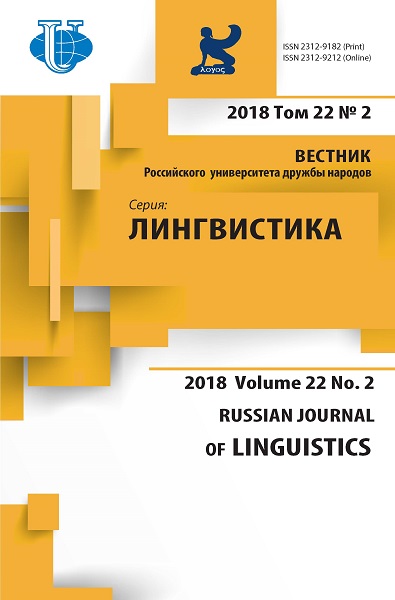PERSUASION IN POLITICAL DISCOURSE: BARAK OBAMA’S PRESIDENTIAL SPEECHES AGAINST ISIS
- Authors: ALEMI M.1, LATIFI A.2, NEMATZADEH A.2
-
Affiliations:
- Islamic Azad University
- Sharif University of Technology
- Issue: Vol 22, No 2 (2018)
- Pages: 278-291
- Section: POLITICAL AND MEDIA DISCOURSE
- URL: https://journals.rudn.ru/linguistics/article/view/18588
- DOI: https://doi.org/10.22363/2312-9182-2018-22-2-278-291
- ID: 18588
Cite item
Full Text
Abstract
About the authors
MINOO ALEMI
Islamic Azad University
Email: Minooalemi2000@yahoo.com
Assistant Professor of Applied Linguistics at Islamic Azad University, West Tehran Branch, and a post-doctoral associate at Sharif University of Technology (SUT), Iran. She is the associate editor of Applied Pragmatics (John Benjamins) and sits on the editorial/review boards of many journals, including British Journal of Educational Technology, BRAIN, LIBRI, and Scientia Iranica. Her areas of interest include discourse analysis, interlanguage pragmatics, materials development, and robot-assisted language education Shariati St., 1949663311, Tehran, Iran
ASHKAN LATIFI
Sharif University of Technology
Email: ashkan.latify@gmail.com
holds an MA in Applied Linguistics from Sharif University of Technology and is currently an MA student of Sociology at Bu-Ali Sina University. His areas of interest are neuropsychology, psycholinguistics, neurolinguistics, and sociolinguistics Azadi Ave., 11365-11155, Tehran, Iran
ARASH NEMATZADEH
Sharif University of Technology
Email: arash67nematzadeh@gmail.com
holds an MA in Applied Linguistics from Sharif University of Technology. His areas of interest are sociolinguistics, discourse analysis, interlanguage pragmatics, and materials development Azadi Ave., 11365-11155, Tehran, Iran
References
- Abdel-Moety, D. M. (2015). American political discourse as manifested in Hillary Clinton’s interviews: A critical approach. English Linguistics Research, 4(1), 1-13.
- Abdullahi-Idiagbon, M. S. (2010). Language use in selected Nigerian Presidential election campaign speeches: A critical discourse analysis perspective. Journal of the Nigeria English Studies Association, 13 (2), 30-44.
- Ahearn, L. M. (2001). Language and agency. Annual Review of Anthropology, 30, 109-137.
- Al-Faki, I. M. (2014). Political speeches of some African leaders from linguistic perspective (1981-2013). International Journal of Humanities and Social Science, 4(3), 180-198.
- Al-Majali, W. (2015). Discourse analysis of the political speeches of the ousted Arab Presidents during the Arab Spring Revolution using Halliday and Hasan's framework of cohesion. Journal of Education and Practice, 6(14), 96-109.
- Bakhtin, M. M. (1981). The Dialogic Imagination: Four Essays. Austin: Texas University Press.
- Bayram, F. (2010). Ideology and political discourse: A critical discourse analysis of Erdogan’s political speech. ARECLS, 7, 23-40.
- Bleiker, R. (2003). Discourse and human agency. Contemporary Political Theory, 2(1), 25-47.
- Bussmann, H. (1996). Routledge Dictionary of Language and Linguistics, Trauth, G. & K. Kazzazi (eds. and trans.). London: Routledge.
- Cook, G. (1994). Discourse and Literature: The Interplay of Form and Mind. Oxford: Oxford University Press.
- Cook, G. (2011). Discourse Analysis. In Simpson, J. (ed.) The Routledge Handbook of Applied Linguistics. New York: Routledge, 431-445.
- Fairclough, N. (1989). Language and Power. London: Longman.
- Foucault, M. (1980). Power/Knowledge: Selected Interviews and Other Writings 1972-1977, Gordon, C. (trans.). New York: Pantheon Books.
- Harwood, N. (2005). We do not seem to have a theory... The theory I present here attempts to fill this gap: Inclusive and exclusive pronouns in academic writing. Applied Linguistics, 26(3), 343-375.
- Hymes, D. (1962). The ethnography of speaking. Anthropology and Human Behavior, 13(53), 11-74.
- Jarraya, S. (2013). Persuasion in Political Discourse: Tunisian President Ben Ali's Last Speech as a Case Study. Syracuse University, Tunisia.
- Khany, R., & Hamzelou, Z. (2014). A systemic functional analysis of dictators' speech: Toward a Move-based Model. Social and Behavioral Sciences, 98, 917-924.
- Pu, Ch. (2007). Discourse analysis of President Bush’s speech at Tsinghua University, China. Intercultural Communication Studies, 16(1), 205-216.
- Sarfo, E., & Krampa, E. A. (2013). Language at war: A critical discourse analysis of speeches of Bush and Obama on terrorism. International J. Soc. Sci. & Education, 3(2), 378-390.
- Saville-Troike, M. (2006). Introducing Second Language Acquisition. Cambridge University Press.
- Scheibman, J. (2004). Inclusive and Exclusive Patterning of the English First Person Plural: Evidence from Conversation. In Michel, A. & S. Kemmer (eds.) Language, Culture, and Mind. Stanford: CSLI Publications, 377-396.
- Searle, J. (1978). Speech Acts: An Essay in the Philosophy of Language. London: Cambridge University Press.
- Shayegh, K., & Nabifar, N. (2012). Power in Political Discourse of Barak Obama. Journal of Basic and Applied Scientific Research, 2(4), 3481-3491.
- Solin, A. (2011). Genre. In Zienkowski, J., Östman, J. & J. Verschueren (eds.) Discursive Pragmatics. John Benjamin B.V., 119-135.
- Trappes-Lomax, H. (2004). Discourse Analysis. In Davies, A. & C. Elder (eds.) The Handbook of Applied Linguistics. Blackwell Publishing, 133-165.
- Van Dijk, T. A. (2002). Critical Discourse Studies: A Sociocognitive Approach. In Wodak, R. & M. Meyer (eds.) Methods of Critical Discourse Analysis. London: Sage, 95-120.
- Van Leeuwen, Th. (2008). Discourse and Practice: New Tools for Critical Discourse Analysis. New York: Oxford University Press, Inc.
- Wang, J. (2010). A critical discourse analysis of Barack Obama’s speeches. Journal of Language Teaching and Research, 1(3), 254-261.
- Widdowson, H. G. (2007). Discourse Analysis. New York: Oxford University Press.
- Wilson, J. (1990). Politically Speaking: The Pragmatic Analysis of Political Language. Oxford: Basil Blackwell.
- Wodak, R. (2005). Editorial: Global and local patterns in political discourses -‘Glocalisation’. Journal of Language and Politics, 4(3), 367-370.
- Wodak, R. (2006). Doing politics: The discursive construction of politics. Journal of Language and Politics, 5(3), 299-303.
Supplementary files















